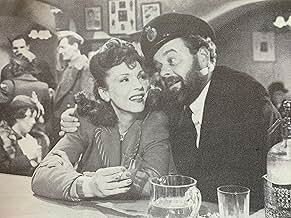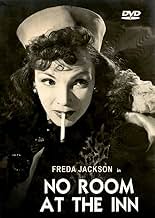Two children are evacuated during World War Two into the care of an alcoholic woman.Two children are evacuated during World War Two into the care of an alcoholic woman.Two children are evacuated during World War Two into the care of an alcoholic woman.
- Director
- Writers
- Stars
Marie Ault
- Vicar's Maid
- (uncredited)
Vera Bogetti
- Barmaid
- (uncredited)
- Director
- Writers
- All cast & crew
- Production, box office & more at IMDbPro
Featured reviews
I was Ronnie and my stage name was Stanley Conett (Stanley Heinemann) I played that part for 427 performances at the Winter Garden. Then toured England and Scotland with the show. Also I did the BBC version.It is a pity that you have published the wrong actor's name for the Winter Garden version of the show.
I was too tall to be in the film version. The Theater version often caused the audience to erupt with shouting and curses at Fred Jackson. The show ended with the girls suffocating Mrs.Voray and it was different in the movie.
Ref -corrected version in Wikipedia.
I was in the U.K.throughout the war, I was an evacuee. My treatment was just like this movie. I saw it when it first came out, I was 15 years old and had been working for a little over a year, in London. Although somewhat sad it was also very amusing. Films like this leave a lasting impression. I remember one line in particular when the small boy got hold of a hat and stuck it in the pitcher, the comment was "What happened to me Sailor Beware", it was a womens sailor hat.
If you have lived through a war, buzz bombs, being bombed out, you would not appreciate the artistry of this production as much as I did.
If you have lived through a war, buzz bombs, being bombed out, you would not appreciate the artistry of this production as much as I did.
Yes i was in the same boat.With a dragon of a woman chasing my sister brother and me, i think for her sport.The scene that stands out for me was when one of them say's You.v Broke Me Bleed-en feather.I remember very well the war years.Three of my cousins were buried alive in the blitz of Portsmouth.Being a naval port it got it's share.We ended up living in tent's courtesy of the army.I think this film depicted some of the deplorable situations that children were placed in.I think the small amount of comedy gave it the lift it so badly needed.I know it made an everlasting impression on me.I wonder if by to-days standards it would have won Best Picture Of The Year.I should think so.
From the opening shot of a department store, with a background choir singing "Once in Royal David's City," this turns out to be an engrossing, evocative & still-powerful film, which has much merit in the message it portrays. Although it dates from 1948, and I have only seen the truncated version of 63 minutes (does anyone have the full version available?) the film is a credit to all concerned. It carries a direct and hard hitting message, and the influence of the great Dylan Thomas is clear for all to see. The casting is top notch, and Freda Jackson plays a thoroughly despicable, two-faced harridan in grand style. In its day, it must have been a forceful, and probably unpalatable, slice of life, with the exposure of dual standards particularly unsettling in certain quarters. Although a work of fiction, it comes across as very true to life and totally believable. It's a must-see film!
A full-blooded post-War British melodrama set during World War 2, adapted from a stage play, co-scripted by Dylan Thomas and directed by Daniel Birt (see also THE THREE WEIRD SISTERS) and starring hatchet-faced Freda Jackson as wicked landlady Mrs Voray who takes in orphaned children and spends their allowance on drink and finery. Narrated in flashback by Mary O'Rane (Ann Stephens) as she recalls the experiences that turned both her and fellow orphan Norma Bates (get that name!), played by feisty Joan Dowling, into petty thieves, this has apparently been considerably opened out by co-scripter Thomas, to take in a less than thinly veiled attack on Church and State, as well as the kind of class hypocrisy that allowed middle-class types to tut-tut behind their net curtains at the dirty-faced urchins and carousing working-class slatterns, whilst simultaneously cooking up barely credible excuses not to take the hapless youngsters in; even when begged by a selfless and community-spirited young schoolmistress. Described at the time by 'Today's Cinema' as a '...completely sordid canvas...' and a work of '...cruelty which has no parallel on British screens...', this was clearly strong meat in its day and, even though time has dimmed much of its initial power and rendered some of its sentiment a shade sugary, its theatrics a trifle hammy and its portentous religious overtones somewhat trite and banal, this is still an undeniably downbeat tale of often almost Victorian squalor. Partially leavened by occasional shafts of wit (e.g. Voray recalls her ex-husband 'Nobody bothered about his family tree - except the dogs'), humorous comic stereotypes and sharp-tongued kids, this still packs a fair wallop; thanks in no small measure to Jackson's vividly etched turn as the kind of vicious and spiteful harridan who appears to have stepped out of a tale by the Brothers Grimm. Definitely worth a look for those interested in the often overblown, but nevertheless entertaining, school of post-War British genre cinema.
Details
- Runtime
- 1h 22m(82 min)
- Color
- Aspect ratio
- 1.37 : 1
Contribute to this page
Suggest an edit or add missing content




















